Did Elvis Presley Write Any Songs? Yes, Elvis did contribute to songwriting, though his involvement sparks debate. Let’s explore the King’s songwriting credits, the controversies, and the truth behind his musical contributions so you can license music with confidence and maximize your payoffsong.com revenue, even if you’re a songwriter, music publisher, or sync agent. Dive in to discover the facts about Elvis’s songwriting and how it impacts music royalties and song licensing.
1. Elvis Presley: Songwriter or Just a Singer?
Elvis Presley is celebrated as the King of Rock and Roll, but his role as a songwriter is often debated. While he didn’t pen lyrics and melodies for his greatest hits, Elvis did have a hand in composing some of his lesser-known songs, and his name appears on the songwriting credits of a few iconic tracks. The real question is, how much did he really contribute?
1.1. The Quora Question: Fairness and Changes
A common question arises: Was it fair for Elvis to demand and receive 50% of the credit for writing a song if the songwriter wanted him to record it? The short answer is no, it wasn’t fair, but it was legal. How much did he actually change such songs? That varies. It wasn’t fair for Elvis to receive credit for writing a song in exchange for recording it. Fortunately, it didn’t happen very often.
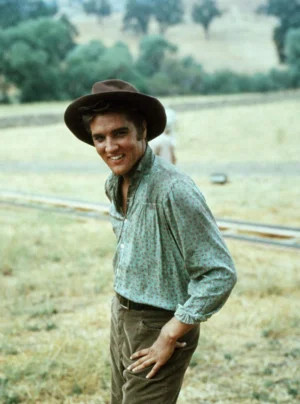 Elvis Presley candid photo from the set of Love Me Tender, 1956, highlighting his credited songwriting during that movie's production
Elvis Presley candid photo from the set of Love Me Tender, 1956, highlighting his credited songwriting during that movie's production
1.2. The Eight Songs: A Brief Songwriting Career
Elvis’s name appeared on the songwriting credits of eight songs early in his recording career, including massive hits like Don’t Be Cruel, Love Me Tender, and All Shook Up. This gave the impression that the rising star was also a talented songwriter. Yet, despite the enormous success of these songs, his career as a composer abruptly ended in early 1957. The issue of Presley’s name as a co-writer has always been controversial because it raises questions about his integrity and fairness.
1.3. The Fan’s Perspective vs. The Critics’ View
Fans want to believe that Elvis actively participated in writing some of his biggest hits. However, critics and historians have often been skeptical. Did Elvis cheat songwriters out of their royalties? If he did contribute significantly, why did he stop writing songs after All Shook Up?
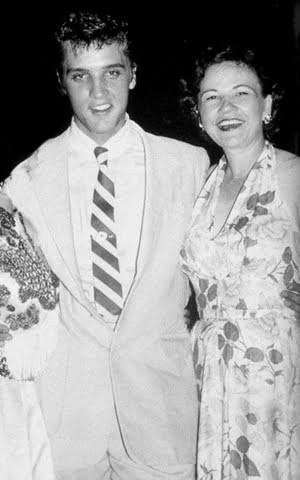 Elvis Presley with Mae Boren Axton in May 1955, when she interviewed him for her radio station, early in his career
Elvis Presley with Mae Boren Axton in May 1955, when she interviewed him for her radio station, early in his career
2. Unraveling the Songwriting Credits
The mystery of Elvis as a songwriter boils down to eight songs recorded early in his career that list him as a co-writer. It’s often assumed that Colonel Parker, Elvis’s manager, required songwriters to surrender a portion of their credit and royalties for Elvis to record their songs. This practice, however, wasn’t exclusive to Elvis and may have involved Hill & Range Music Publishers.
2.1. The Conspiracy: Elvis, Parker, and Hill & Range
It’s suggested that Colonel Parker held up songwriters, demanding they surrender part of their songwriting credit for Elvis to record their songs. This conspiracy may have included Elvis and Hill & Range Music Publishers. People with no compositional input often received credit, a practice predating rock & roll. Reasons for sharing credit varied, from personal to business-related, and sometimes coercion was involved.
2.2. The Alteration Argument
One theory suggests that Elvis substantially altered songs during recording, justifying his co-writing credit. This meant that Elvis might have tweaked lyrics, rearranged verses, or adjusted the tempo. This conspiracy lasted less than a year and mainly involved Ken Darby and Otis Blackwell, who wrote three and four songs respectively.
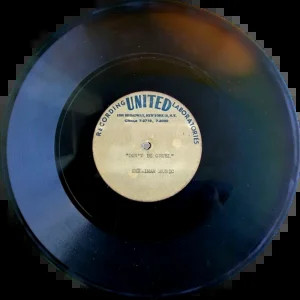 Otis Blackwell's demo disc for Don't Be Cruel, showcasing his songwriting talent and the original version of the hit song
Otis Blackwell's demo disc for Don't Be Cruel, showcasing his songwriting talent and the original version of the hit song
3. The Eight Songs in Detail
Let’s examine the eight recordings that credit Elvis Presley as a songwriter, looking at the real writers, publishers, and recording dates.
3.1. Heartbreak Hotel
- Listed Writers: Mae Boren Axton, Tommy Durden, Elvis Presley
- Actual Writers: Mae Boren Axton, Tommy Durden
- Publisher: Tree Publishing
- Date Recorded: January 10, 1956
Heartbreak Hotel was Elvis’s first single for RCA Victor. Legend has it that Mae Boren Axton offered Elvis one-third of the songwriting credit and royalties if he made it his first single with his new company.
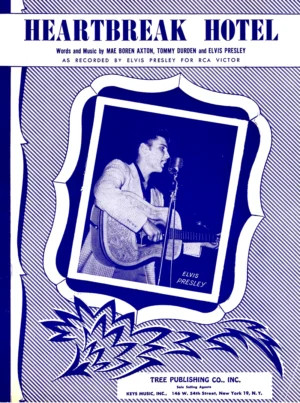 Original sheet music for Heartbreak Hotel, Elvis Presley's debut single with RCA Victor, co-credited to him despite not contributing to the writing
Original sheet music for Heartbreak Hotel, Elvis Presley's debut single with RCA Victor, co-credited to him despite not contributing to the writing
3.1.1. Did Elvis Write Any of This Song?
No, he didn’t. The songwriting credits have remained consistent across various formats, from vinyl to digital downloads.
3.2. Don’t Be Cruel
- Listed Writers: Otis Blackwell, Elvis Presley
- Actual Writer: Otis Blackwell
- Publisher: Shalimar Music, Elvis Presley Music
- Date Recorded: July 2, 1956
Otis Blackwell, a singer turned songwriter, reportedly sold six songs to Shalimar Music for $150 in late 1955. The publisher submitted the songs to Hill & Range, who then presented them to Elvis.
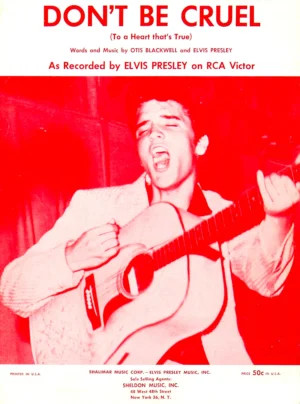 Original sheet music for Don't Be Cruel, co-credited to Elvis Presley despite being solely written by Otis Blackwell
Original sheet music for Don't Be Cruel, co-credited to Elvis Presley despite being solely written by Otis Blackwell
3.2.1. Did Elvis Write Any of This Song?
Absolutely not. Original U.S. records from 1956 through mid-1958 credit Otis Blackwell as the sole songwriter. It wasn’t until September 1958 that both Blackwell and Presley were listed as co-writers.
3.3. Love Me Tender (Movie Soundtrack)
- Love Me Tender, We’re Gonna Move, Let Me, Poor Boy
- Listed Writers: Elvis Presley, Vera Matson
- Actual Writers: Ken Darby, Vera Matson, Elvis Presley
- Publisher: Elvis Presley Music
- Date Recorded: August 24 and September 4-5, 1956
The soundtrack to Elvis’s first movie is another point of contention. These four songs were purportedly written by Ken Darby, the movie’s music director, but credit was assigned to his wife, Vera Matson, and Elvis.
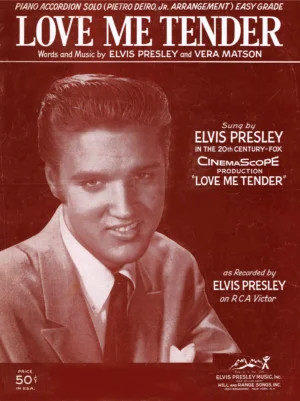 Original sheet music for Love Me Tender, crediting Elvis Presley and Vera Matson, while the actual composer was Ken Darby
Original sheet music for Love Me Tender, crediting Elvis Presley and Vera Matson, while the actual composer was Ken Darby
3.3.1. Ken Darby’s Explanation
Darby explained that the credit was split because Presley was affiliated with BMI, while Darby was with ASCAP. In those days, ASCAP and BMI writers couldn’t share credit on the same song. Elvis was simply “given” the credit through a deal made by Colonel Parker.
3.3.2. Trude Forsher’s Account
Trude Forsher, Colonel Parker’s secretary, provided a different account. She claimed that Elvis chose the melody for Love Me Tender, and Vera Matson wrote a few stanzas. Elvis then adjusted the music and lyrics to fit his presentation.
3.3.3. Did Elvis Write Any of These Songs?
Perhaps. If Vera Matson wrote some stanzas and Elvis adjusted the music and lyrics, they legitimately deserve co-writing credit with Darby. However, the songwriting credit has remained unchanged across various formats.
3.4. Paralyzed
- Listed Writers: Otis Blackwell, Elvis Presley
- Actual Writer: Otis Blackwell
- Publisher: Elvis Presley Company, Shalimar Music
- Date Recorded: September 1, 1956
All known Presley records from the 1950s credit Otis Blackwell as the sole songwriter for Paralyzed. Interestingly, the original sheet music lists both Blackwell and Presley as the songwriters.
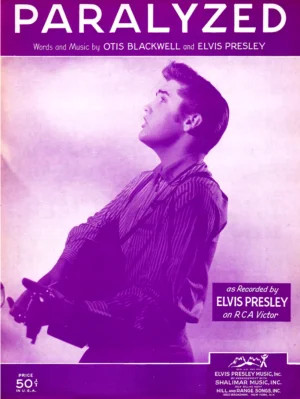 Original sheet music for Paralyzed, initially crediting Otis Blackwell and Elvis Presley, later corrected to solely Otis Blackwell
Original sheet music for Paralyzed, initially crediting Otis Blackwell and Elvis Presley, later corrected to solely Otis Blackwell
3.4.1. Did Elvis Write Any of This Song?
No, he did not. Records manufactured as late as March 1958 credited Paralyzed solely to Blackwell. It wasn’t until 1962 that new pressings attributed co-writing credit to both Blackwell and Presley.
3.5. All Shook Up
- Listed Writers: Otis Blackwell, Elvis Presley
- Actual Writer: Otis Blackwell
- Publisher: Shalimar Music
- Date Recorded: January 12, 1957
Surprisingly, the first recording of All Shook Up was by David Hill, released as I’m All Shook Up in February 1957, before Elvis’s version. Despite positive reviews, it wasn’t a hit.
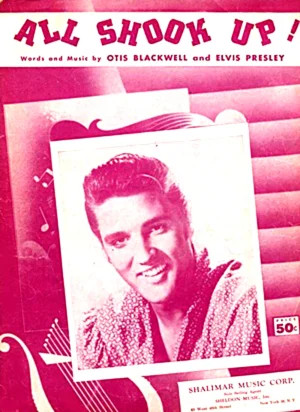 Original sheet music for All Shook Up, co-credited to Otis Blackwell and Elvis Presley, though solely written by Blackwell
Original sheet music for All Shook Up, co-credited to Otis Blackwell and Elvis Presley, though solely written by Blackwell
3.5.1. Did Elvis Write Any of This Song?
Not at all. Nonetheless, the song remains credited to both Blackwell and Presley.
4. Otis Blackwell’s Perspective
Why didn’t Otis Blackwell complain about sharing songwriting credits with Elvis? The argument is that receiving half the royalties for a song that sold millions was better than receiving all the royalties for a song that sold only thousands. Blackwell made approximately $80,000 in songwriting royalties from Presley’s records in the last six months of 1956 alone.
4.1. Blackwell’s Chicago Tribune Interview
In a 1988 interview, Blackwell stated, “He had the hips and the hair and the skin. I had the music. He got famous, and I got rewards. I think that’s fair.”
4.2. The End of an Era
According to Ernst Jorgensen in Elvis Presley: A Life in Music, All Shook Up was the last time Blackwell or any other writer suffered that indignity. Elvis and his song publisher partners feared criticism from journalists and the public.
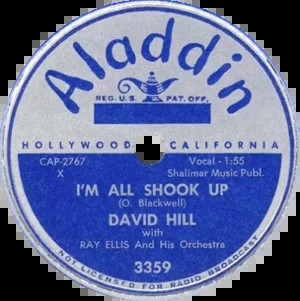 Original 78 rpm pressing of David Hill's I'm All Shook Up, the first version of the song, crediting only Otis Blackwell as the writer
Original 78 rpm pressing of David Hill's I'm All Shook Up, the first version of the song, crediting only Otis Blackwell as the writer
5. Conclusion: Elvis’s Songwriting Legacy
Did Elvis know about the credit-sharing arrangements? It’s hard to imagine he was unaware, but it’s possible he trusted Colonel Parker to handle business matters. By the end of 1956, Presley and Parker likely realized they didn’t need the extra money enough to ask songwriters to generously share their credit.
5.1. The Motivation Behind It All
The Presley family wasn’t wealthy when Elvis signed with RCA Victor in 1955. The credit-sharing arrangement was likely a means to increase their income, regardless of the integrity implications.
5.2. The Shift After All Shook Up
Elvis stopped attaching his name to songs after All Shook Up. My guess? By then, Presley and Parker knew they didn’t need the money enough to ask their songwriter to generously “share” their credit with Elvis.
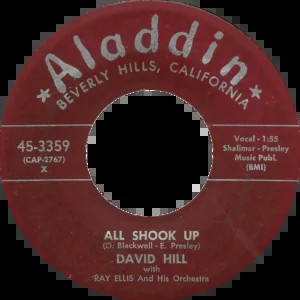 Original 45 rpm pressing of David Hill's All Shook Up, released after Elvis's version, co-crediting Blackwell and Presley as writers
Original 45 rpm pressing of David Hill's All Shook Up, released after Elvis's version, co-crediting Blackwell and Presley as writers
6. FAQs: Elvis Presley and Songwriting
Here are some frequently asked questions about Elvis Presley and his involvement in songwriting, with concise answers and additional insights.
6.1. Did Elvis Presley actually write any songs himself?
While Elvis Presley is primarily known as a performer, he did receive songwriting credits for a few songs, though the extent of his actual contribution is debated.
6.2. How many songs is Elvis Presley credited as a writer on?
Elvis Presley is officially credited as a co-writer on eight songs, mainly recorded in the early part of his career.
6.3. What are some of the most famous songs Elvis Presley is credited with writing?
Some of the most famous songs where Elvis Presley is credited as a co-writer include Heartbreak Hotel, Don’t Be Cruel, Love Me Tender, and All Shook Up.
6.4. Did Elvis Presley contribute to the lyrics or music of the songs he’s credited on?
The extent of Elvis’s contribution varies. In some cases, it’s believed he made minor adjustments, while others suggest his name was added for business reasons.
6.5. Was it common for performers to receive songwriting credit even if they didn’t write the song?
Yes, it was not uncommon for performers to receive songwriting credit in exchange for recording a song, boosting its popularity, which sometimes happened with Elvis.
6.6. Why did Elvis Presley stop receiving songwriting credits after 1957?
After the controversy surrounding shared credits and concerns over public perception, Elvis and his management likely decided to avoid such arrangements.
6.7. Who were the primary songwriters Elvis Presley collaborated with?
Elvis Presley collaborated with songwriters like Otis Blackwell and Ken Darby, though the nature of these collaborations often involved credit-sharing arrangements.
6.8. How did Otis Blackwell feel about sharing songwriting credit with Elvis Presley?
Otis Blackwell acknowledged that while Elvis got famous, he received financial rewards, which he considered a fair exchange.
6.9. How can I license music for my projects?
To license music, visit platforms like payoffsong.com to explore various tracks, obtain necessary licenses, and ensure compliance with copyright laws.
6.10. What are the key considerations when licensing music for commercial use?
Key considerations include understanding the type of license needed (sync, master, public performance), budget, and the scope of usage to ensure proper legal compliance.
7. Maximize Your Music Revenue with Payoffsong.com
Are you a songwriter, music publisher, or sync agent looking to maximize your revenue? Payoffsong.com offers a comprehensive platform to help you succeed in the music industry. Here’s how:
- Extensive Licensing Options: Discover numerous opportunities to license your music for films, TV shows, advertisements, and more.
- Royalty Collection: Ensure you receive fair compensation for your work through efficient royalty collection services.
- Expert Guidance: Gain access to valuable resources and expert advice on music publishing, copyright, and licensing agreements.
- Networking Opportunities: Connect with industry professionals, including music supervisors, ad agencies, and film producers.
By leveraging payoffsong.com, you can navigate the complexities of music licensing and unlock new revenue streams for your songs.
8. Call to Action
Ready to explore the potential of your music? Visit payoffsong.com today to discover licensing opportunities, understand your copyright options, and connect with industry experts. Maximize your earnings and take your music career to the next level!
Address: 1601 Vine St, Los Angeles, CA 90028, United States
Phone: +1 (323) 469-2211
Website: payoffsong.com
